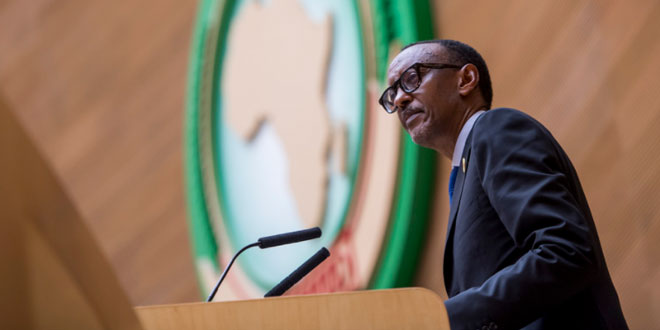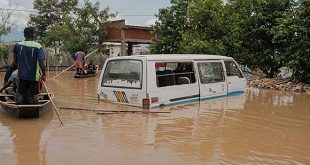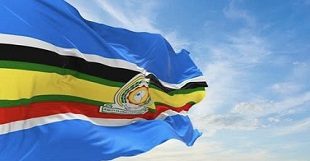
She was taken for a ride by Karegyeya, Kayumba, Sendashonga’s wife and the entire group of anti-Kagame haters
THE LAST WORD | ANDREW M. MWENDA | This is a second installment of my three-part review of Michela Wrong’s book, `Do Not Disturb’, about the murder of Patrick Karegyeya. Many readers of Part One missed the core of my argument. I did not seek to argue that the government of Rwanda under the leadership of President Paul Kagame does not hunt to kill its enemies abroad. I only meant to illustrate that Wrong did not do basic investigative journalistic work of trying to look at different hypotheses and then showing why she believed the one she went with. The core of my argument was that if Kigali has assassinated anyone abroad, that is because of a rational foreign policy, not because of some violent psychopathy of Kagame as a person the way Wrong presented it.
Karegyeya was head of external intelligence in Rwanda from 1994 to 2004. In that capacity, he oversaw the evolution and articulation of that nation’s policy towards the security threats it faces. According to Wrong, Karegyeya once met a friend in Nairobi who asked him why the government of Rwanda indulges in targeted assassinations of its enemies especially in foreign lands. Karegyaya’s answer is reproduced here for clarity.
“You have to understand,” Wrong quotes Karegyeya speaking to someone in Kenya’s capital, Nairobi in 2002, “we are a small and densely populated country. We have a higher population density than any other country in Africa. So we have no space for another war. We just don’t have the strategic geographical depth. Because of that, every threat will be dealt with preemptively and extra territorially, because we do not have room for it to take place on our sovereign territory. So what you call murder is not a crime but an act of war by other means and if it took place in any other circumstances, we would be congratulated and praised for it. We have chosen to externalise the battlefield and preempt the threat. Externalising the war zone is part of that policy and so is buffering.”
This was the real Karegyeya: articulate and genuine, making a rational argument every student of international relations and strategy would understand.
The Karegyeya Wrong interviewed in exile was an opportunist, strategically forsaking things he deeply believed in and did in order to win Western sympathy and support for his anti-Rwanda activities. Karegyeya knew what Western liberals and their cheerleaders in Africa want to hear. To them, leaders in Africa are psychopaths. So Africans need Western governments and their diplomats, backed by their journalists, human rights organisations etc. to save us. Was Wrong easy prey to such manipulation because she carries the baggage of prejudice?
At any rate, Wrong knows that liberal democracies like the USA, UK, France and Israel rely on this policy of preemption and extra territoriality in dealing with threats to their security. Presidents Bill Clinton, George W. Bush and Barack Obama have used assassination of key leaders to degrade Al Qaeda and ISIS. Every day American drones hover over the Syria, Iraq, Libya, Afghanistan, Yemen, etc. targeting and killing those suspected of threatening U.S. security. When Rwanda implements the same policy, Wrong claims it is because Kagame is a violent psychopath. What is the source of these biases? The reader can judge.
Wrong can argue that Israel or America target non-citizens while Rwanda targets her own citizens. This argument has the following weaknesses. First, the issue here is human rights, not citizen rights. Someone does not need to be a citizen for his or her life to be respected.
Second, after 9/11, legal experts, including Obama, argued that the U.S. president has power to target and assassinate U.S. citizens suspected of being top Al Qaeda leaders – wherever they might be. Third is context: the nature of the threats determines the nature of the response and the target of such a response. America and Israel are well consolidated states and nations; their security threats are largely external. The state and nation in Rwanda are still young and fragile and a significant part of their threat is internal.
For instance, no American president or UK prime minister goes to bed worried about a military coup, a civil war or mass insurrection. In our part of the world, states and nations are in the early process of development and consolidation. To make matters worse, elites lack a common agreement on basic national goals.
Consequently, small disagreements among the top leadership can lead some, as Karegyeya, Gen. Kayumba Nyamwasa, Col. Alex Rizinde and Seth Sendashonga did in the case of Rwanda, to attempt coups, insurrections and civil wars. Hence fears of these risks loom in the minds of leaders in poor countries.
This danger is particularly alive in the minds of leaders in a country like Rwanda which, 27 years ago, witnessed horrors on a scale unseen in human history – one million people hacked to death in 100 days using ordinary tools like machetes and hoes. How does one ensure that such a disaster does not befall the country again? Therefore, the weight of responsibility that hangs on the heads of the leaders of Rwanda; especially Kagame is very, very heavy – any slight misstep can take that country back to the abyss.
To understand Rwanda’s hypersensitivity when it comes to security, one has to appreciate what in geopolitics is called the “margin of error”. This refers to the space a country has to make mistakes. When a small mistake can have catastrophic consequences, a system becomes hypersensitive.
The margin of error has two elements: the type and magnitude of danger that a country faces and the power it possesses to neutralise that danger. In Rwanda’s case, the danger is always an attempt at a violent power grab via a civil war or coup. All too often, this danger tends to find allies in neighboring regional powers who are larger and richer than Rwanda – DRC, Tanzania and Uganda. I will illustrate this later when dealing with the assassination of Sendashonga in 1998.
The involvement of neighboring powers in Rwanda’s internal affairs militates around two major vulnerabilities. One is “strategic geographical depth,” a point Karegyeya expounded very well. But this is compounded by limited “strategic political depth”.
 The Independent Uganda: You get the Truth we Pay the Price
The Independent Uganda: You get the Truth we Pay the Price



Okay.
So, from what you say, Miz Wrong is much like Ugandans who excuse or ignore the actions “their people” have done. You instead hear about how disproportionate response and the alleged human rights violations.
That said Andrew, you should see this reporting from the perspective of the level of technology.
People are looking to trend and go viral. They look for the sensational before the factual.
I think you’ve just exonerated all history’s bloodletting tyrants with your reasoning in that, all their hapless victims -it can be argued- were invariably ‘guilty’ of triggering the ‘security antenna.of the state,ie, the person of the state.
One distinguishing mark of tyrants throughout history is the fusing of their self and the state. Their personal detractors automatically become unpatrioric, treasonous ungrateful sub citizens. Some of these dissidents begged to be left alone, to slink back into their private lives, to live the rest of their lives in their country as ordinary people. But that was not enough, they had to bend and grovel or be subjected to further ignominy, instead they chose the cold uninviting livea of the exiled. I vividly remember some of those names during the uganda Rwanda misadventure in Congo. They were passionate about the new Rwanda. To say otherwise is simply disingenuous.
First, a disclaimer: I’ve not yet got the chance to read Miz Wrong’s book entitled “Do not Disturb”.
However, reading from M9’s two previous discussions in which he struggles to discredit the book, one realizes that as usual himself too misses the point.
And the point is that most African leaders have the inability to separate political opponents and the enemies of the state! A political opponent simply doesn’t believe/agree with public policy of the incumbent in as far as running affairs of the state is concerned; whereas an enemy of the state doesn’t like the existence of that particular country regardless of who is in charge!
I will give M9’s very own example of America versus Al Qaeda. To the Al Qaeda group, regardless of who occupies the White House, America as a country remains a foe and vice versa!
But no American president has ever associated their political opponents with the Al Qaeda group since 9/11.
That’s the crystal clear difference between the Western leaders and African rulers!
For example president Paul Kagame of Rwanda and Tibuhaburwa M7 of Uganda don’t know the difference between Al Qaeda/ Al Shabab and Victoria Ingabire, or Bobi Wine/ Dr Kizza Besigye!
They simply lump them as terrorists who must be dealt with militarily! In early 2010, there was a mudslide that buried many people alive in the eastern district of Bududa and Tibuhaburwa went there in military chopper with an AK 47 slung across his chest!
Indeed, African rulers are sychopaths/callous. For instance they’ve divided their citizens into class systems, that’s, the privileged and the less privileged. There are those who will get flown out of the country for better medical care abroad when they fall sick, all expenses paid for by the taxpayers money, and then the less privileged will be left to die here in our own sick Healthcare facilities. Is that a lie Mr Mwenda?
In a nutshell, no one knows what became of Andrew Mwenda of the yesteryears to the extent that he’ll put up a spirited defense of the most indefensible!
“Indeed, African rulers are sychopaths (sic)/callous. … they’ve divided their citizens into class systems …”. I think it’s time people woke up the reality that class divisions occur all over the world, and usually the elite don’t want the status quo to change. It does not happen only in Africa; it’s a human reality.
I will paraphrase an Arab colleague who wrote: “Our terrorists wear suicide vests; your (European) terrorists wear Prada suits.” He was referring to the fact that the Western world uses flowery language for its bad deeds (glorification) while using censorial language (condemnation) for the similar deeds elsewhere, especially in Africa.
I am not saying Africa is a perfect place – but neither is the Western world – but it’s critical we stop using the rest of the world as the gold standard against Africa. Time we looked at our local contexts and started any necessary surgery from there; rather looking to the outside first.
Hey folks!
Uwelugosi, Mr.O and any other longtime followers of Andrew Mwenda, I kindly need your help.
There is an old monitor article whose screen shot I just saw entitled “Only the rich should rule, says Museveni’s son”.
Now the only problem is that the screenshot only covers the first page of that story.
Yet am curious about how Andrew Mwenda debunked Muhoozi’s argument that a plutocracy would ensure peace and stability since the rich always desire a calm and tranquil environment given that they own property.
Any help in form of the screenshot of the second page or a summary of Mwenda’s argument to the best of your memory would be deeply appreciated.
Cheers!
Benjamin
P.S: Also does anyone know of how I can get access to the Andrew Mwenda live audios?
A human being who has hunted his kin should never be exalted. Those who participated in the genocide for whatever reason are forever marked men. It is that palpable unease that simmers below the Rwandan narrative. I have read M9 grief whenever he loses loved ones yet here you still glorify murder. You seem to suggest that murder is the best means that has kept Rwanda stable and I say let everyone own up. All Banyarwanda deserve a life.
Read his first article about the difference between African’s threats and Western threats
1.The first world fights more organised,believable and classy wars with known objectives under organs like NATO and UN.
2.The deadliest jobs in the World are those of hit-men,spies, double agents they always die in the same way i.e either in a woman’s thighs or drug overdose.
3.Even at M7’s worst moments;he is the best of the best.
4.Its only naive ex spies like Kareyegera who die the way they do. Real hit men die when they are nerve poisoned.
5.Do you know how good its feels to the army or police when a MOSSAD,Navy Seal or FBI agent trains them?Those agents reside in Sheraton only while on assignment.
What i find fascinating is that in trying to criticise Wrong’s claims or ideas, Andrew Mwenda ends up validating them in the long run.
I thought so too; inconsistencies in Mwenda’s articles are mind boggling! Mwenda actually confirms that Kagame killed Kareheya…. He makes several statements to this effect e.g. (I am paraphrasing) Rwanda’s security antennae is on high trigger because any error would be costly….. No one shoulf blame Kagame for killing dissidents in another country because Ameria, Britain and Israel are doing the same….. One thing my grandmother taught me is never to lie or try to spin things because you can be consistent.
Meant to say in the last sentence that you can’t be consistent when you tell a lie or spin facts…
This argument doesn’t make much sense – basically we can write off any political murders provided the perpetrators can justify them as some form of self preservation- with this kind of thinking we can justify most of the murders during Amin’s regime -after all his government survived over 20 coups attempts – so Idd Amin had every reason to murder his opponents based on a hunch or a rumor that they intended to overthrow him. Don’t you ask yourself why everyone who falls out with the regime in Rwanda decides to flee the country – instead of staying home to join opposition politics. Rwandan politics is not so unlike what we see in the region – it is not like the neighborhood is comprised of Westminister style democracies – but you don’t see politicians who fall out with gov’ts in Tz, Ug or Kenya running to neighboring countries to form rebel groups – Opposition politics in Rwanda seems to be an extreme sport – the only options people have is to either join the so called “consensus govt” or make a principled stand on issues and risk getting assassinated